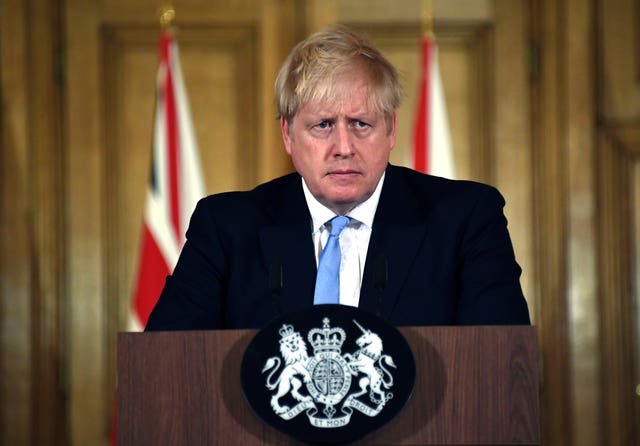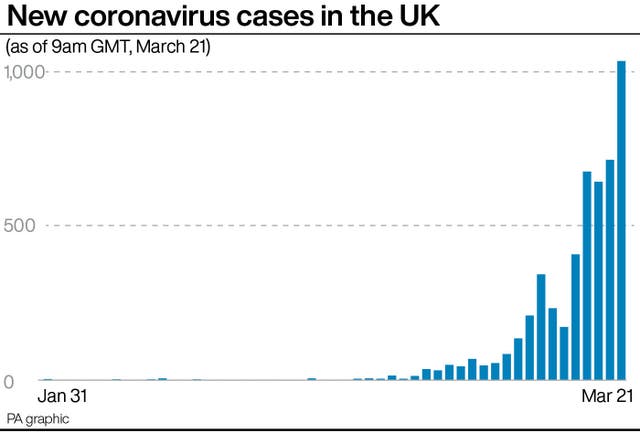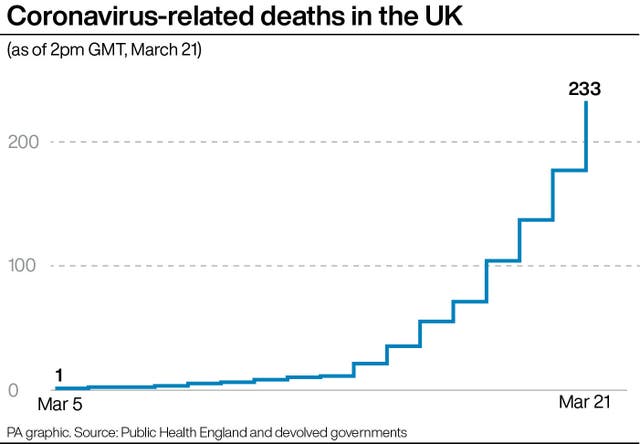Military planners have been called in to help with localised support systems as people at high risk from the coronavirus were urged to stay home for at least 12 weeks.
The move came as Boris Johnson called for Britons to resist visiting their parents on Mother’s Day, with the prime minister warning the Covid-19 outbreak is “accelerating”.
The government and health officials have urged the 1.5 million people in England considered most at risk from the disease because of their health conditions to begin “shielding” themselves by staying at home.
Letters will go out this week “strongly advising” them not to go out for at least 12 weeks from Monday.

Boris Johnson is urging people not to visit their mothers on Mother’s Day (Alberto Pezzali/PA)
The government has also announced a new local support system to ensure people self-isolating at home without support networks can have basic groceries delivered.
Military planners, already helping councils and local resilience forums in their responses to the outbreak, have been centrally involved in setting up the new network.
In a stark message to the country, Johnson said the NHS was in danger of being “overwhelmed” in the same way as the Italian healthcare system unless people heeded government advice on “social distancing”.
His message follows the dramatic announcement on 20 March, that all pubs, restaurants, cinemas and theatres are to shut in the latest move to combat the disease.
The UK’s Covid-19 death toll reached 233 on 21 March, the same as Italy’s total two weeks ago. Italy’s toll has since risen to 4,825, making it the hardest-hit country in the world.

Johnson acknowledged the government was imposing measures “never seen before either in peace or war”, but said they were essential as the outbreak gathered pace.
“The numbers are very stark, and they are accelerating. We are only a matter of weeks – two or three – behind Italy. The Italians have a superb health care system. And yet their doctors and nurses have been completely overwhelmed by the demand,” he said.
“The Italian death toll is already in the thousands and climbing. Unless we act together, unless we make the heroic and collective national effort to slow the spread – then it is all too likely that our own NHS will be similarly overwhelmed.”
Downing Street dismissed a report Johnson had only ordered the measures after French president Emmanuel Macron threatened to block all travellers coming from the UK if he did not act.

The French newspaper Liberation said that in a telephone call on 20 March, the president had warned the rest of the EU would follow suit unless Johnson abandoned his policy of “benign neglect”.
A No 10 spokesperson said: “As the pm said on Friday, these new measures were taken based on scientific advice and following the government’s action plan set out two weeks ago.”
Johnson said while “everyone’s strongest instinct” was to visit their mother on Mother’s Day, the best single present they could give their parent was to stay away and minimise the risk of infection.
“This time the best thing is to ring her, video call her, Skype her, but avoid any unnecessary physical contact or proximity,” he said.
If anyone in your household has #COVID19 symptoms, you must all stay at home:▪️ Read our stay at home guidance: https://t.co/r4JAbl3o8R ▪️ Do not visit your GP or local hospital▪️ Visit https://t.co/OC0v4UtPfJ for further advice pic.twitter.com/spCCA1IQ76
— Public Health England (@PHE_uk) March 19, 2020
“And why? Because if your mother is elderly or vulnerable, then I am afraid all the statistics show that she is much more likely to die from coronavirus, or Covid-19. We cannot disguise or sugar-coat the threat.”
Asked on Friday whether he would be seeing his own mother, the prime minister said he would “certainly be sending her my very best wishes and hope to get to see her” before his voice trailed off.
A Downing Street source later clarified that his contact with his mother on Sunday would be confined to a conversation over Skype.
We want to protect you. But to do so, we need you to do your bit. #StayHomeSaveLives pic.twitter.com/oSAzFF5AWk
— Boris Johnson #StayHomeSaveLives (@BorisJohnson) March 21, 2020
The latest official figures released on 21 March showed the number of people across the UK who have died after testing positive for Covid-19 has risen to 233, with 53 more deaths in England, two in Wales and one in Scotland.
Those being urged to stay at home include people who have received organ transplants, those severe with respiratory conditions such as cystic fibrosis and severe chronic bronchitis (COPD), and with some cancers such as those of the blood or bone marrow.
They also include some – though not all – of those receiving certain types of drug treatments including those which suppress the immune system – leaving the body less able to fight off the virus.
Where possible, they will receive regular text messages containing advice and guidance on how to manage their condition while at home, including having prescriptions delivered and accessing support for daily living.
Those living with them are urged to “stringently” minimise any personal contact.

















